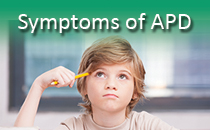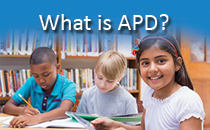APD can be mistaken for or coexist with other disorders

Auditory Processing Disorder (APD) is a deficit in the auditory neural pathways in the central nervous system that is not the result of more global deficits such as intellectual disabilities, autism spectrum disorder, or attention deficits.
Many disorders share common characteristics and are often interrelated. Because many symptoms of Auditory Processing Disorder overlap with other disorders, children are sometimes misdiagnosed or may have a coexisting condition along with APD. For example, a child may be diagnosed with ADD (Attention Deficit Disorder), ADHD (Attention Deficit Hyperactivity Disorder), PDD (Pervasive Developmental Delay), Autism Spectrum Disorder, Sensory Processing Disorder, Receptive Language Disorder, or Mixed Expressive-Receptive Language Disorder, because all of these conditions could affect how a child processes spoken information. We utilize a multidisciplinary approach, gaining helpful insights from a child’s teachers and from a range of specialists who have performed evaluations or are providing services. Reports from any psychologists, psychometrists, speech-language pathologists, occupational therapists, vision therapists, and dyslexia therapists or reading specialists who have been working with a child are all taken into consideration and thoroughly analyzed alongside the results of the APD evaluation. With this in-depth approach we gain an extensive understanding of each child’s unique needs and can develop recommendations that are tailored specifically for each child.
Language disorders often coincide with auditory processing deficits in children. However, not all children with speech-language delays necessarily have an auditory processing disorder, and similarly, not all children with APD will experience delays in their speech and language development. The ability to perceive and retain auditory input plays a crucial role in fostering higher-level language abilities. An accurate and efficient auditory system empowers the brain to skillfully interpret heard messages, enabling seamless communication and providing the necessary tools for a child to reach their full potential in both academic and social domains.
When a child struggles with auditory processing speed and accuracy, language skills are frequently affected, leading to persistent speech production errors and delayed language development. Studies indicate that individuals with language delays might have auditory cortex neurons firing at a slower pace, making it challenging to process rapid speech sounds (e.g., b/d, p/b), which can contribute to a speech/language disorder. Decoding auditory information becomes an uphill task for these children, requiring them to exert more effort to comprehend spoken words than their peers. This strain results in significant fatigue, leaving fewer cognitive resources available for learning and active engagement in discussions.
Our focus is on addressing these challenges, empowering children to decode and process auditory information efficiently. Through tailored interventions, we strive to enhance their auditory processing abilities, leading to improved language skills, increased confidence, and a brighter path towards academic and social success.
Psychoeducational Evaluations and Speech-Language Evaluations do NOT test for APD
Many parents do not realize that a Psychoeducational Evaluation or Speech-Language Evaluation does NOT test for APD. Tests may incorporate the terms “auditory processing” or “auditory perception” but they are actually assessing higher-level language processing, memory for lists, or phonological awareness. These are different skills than those assessed during an APD evaluation. Many children with APD will score normally on tests of language comprehension, memory span for lists, or phonological awareness.
In a research study by Dr. Jay R. Lucker, Audiologist & Speech-Language Pathologist Specializing in Auditory Processing Disorders & Language Processing Disorders at Howard University, which looked at the number of children evaluated for auditory and language issues related to APD, he found that 39% of children with APD passed all the language tests and failed auditory processing tests. Therefore, a speech-language evaluation cannot rule out the need for an APD evaluation. Many children would be overlooked because the skills assessed are different.
Receiving treatment for the specific deficit skills is more important than a diagnosis/label
While some people remain skeptical about auditory processing disorder as a distinct clinical entity from a receptive language disorder, research clearly indicates individuals with weak auditory processing skills can benefit from auditory processing therapy. There is not a distinct separation between auditory processing of sound and language processing of the same stimulus. The brain is complex, and the entire system must work together for an individual to be able to make sense of sound, be able to communicate effectively, and learn. If there are problems in receiving and transferring an acoustic signal, it will often lead to linguistic problems in interpreting the meaning encoded in the signal. Comprehending and responding appropriately to auditory signals involves many neurological structures that are overlapping and must work in cooperation. More important than a diagnosis/label is a description of the specific deficit skills each individual has so that effective treatment can be implemented to resolve the difficulties.
APD therapy is not the same as speech/language therapy. Many speech/language pathologists are not trained in how to provide auditory processing therapy. Quite often they work on the same skills that they would work on for a child with a receptive language disorder instead of improving the underlying auditory processing deficits. When therapy is individualized to target remediation of each child’s auditory processing deficits, children can improve and often overcome the processing deficits that interfere with comprehension and communication.
Research with brain imaging studies and cortical potentials (brain waves generated in in response to hearing sound) shows that the brain is capable of change from stimulation. There is evidence that auditory neural pathways can be strengthened, and new pathways can be created. Therefore, even if a child has multiple diagnoses, a child can become a more active listener and become more confident in listening and learning situations with therapy targeted towards improving that child’s specific auditory processing deficits. Learn more about the specific skills assessed in a comprehensive APD evaluation.




